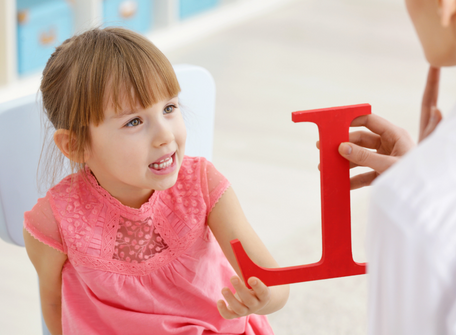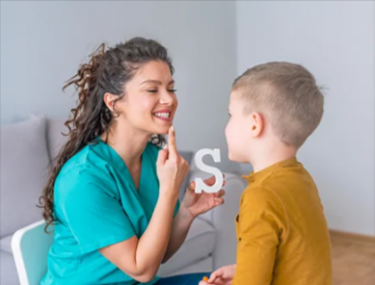To overcome speech issues, it’s important to know when to consult a therapist. If your child is more than one age group behind, then you should seek help. What a speech therapist does, and what milestones children typically reach, are described in the following blog.
Make a decision about your child based on this list.
- Communicating or speaking slowly
- To peers, family members, and friends, the speech is unclear or unintelligible
- Neither gestures nor babble are used by children to communicate
- Lacks social skills or limited eye contact
- A lack of proficiency in written language
- The inability to process written or verbal information
- Having trouble remembering things
Communication Skills
It is important for a child to be able to express their needs, wants, and ideas. From anxiety to withdrawal, a child who doesn’t feel heard or understood can experience a wide variety of problems.
Speech and language play an important role in a child’s development, since communication and interaction with others are essential to the human experience. Building healthy communication skills begins with helping your child develop these skills, whether at home or with a speech pathologist.
Social Skills
The development of children depends heavily on their ability to socialize. For children to form friendships and form bonds with their parents, siblings, teachers, etc., they must be able to interact with others.
Language comprehension, the ability to put ideas together, and response are essential skills for children. Healthy social interactions require these skills. Humans are social animals, so speech and language skills are crucial to a child’s development.
Development of Emotions and Behaviors
A child’s ability to understand others depends on his or her speech and language skills. Empathy and compassion are developed when we understand that others also have feelings and needs. As a result of this understanding, significant behavioral and emotional changes occur.
Besides helping children develop compassion, speech and language also helps them gain confidence and self-esteem. It feels good to be understood. In addition to providing children with a baseline of emotional security and confidence, speech and language skills also give them a sense of self-confidence
Child Speech Development Milestones
Here are the milestones your child should meet if you’re concerned about their speech and language development.
Six to Twelve Months
- Detects facial expressions and voice tones
- Listens to sounds and voices
- Talking incessantly
- Vocalizes with others in turns
- Recognizes some names
One to Two Years
- Provides familiar responses, such as their name
- Waving and other common gestures are understood
- A noun is usually the only keyword that can be understood in a sentence
Two to Three Years
- Follows instructions in two parts
- Points to body parts, clothing items, toys, food, etc.
- Run, for example, is an action name
- Around 250-300 words are in a child’s vocabulary by the time he or she is two years old
- Approximately 1000 words can be found in a three-year-old’s vocabulary
- A sentence should contain at least two to three words
- Long monologues to oneself
- Presents current events
- A basic understanding of grammar, including plurals, articles, progressives (-ings), pronouns like ‘I’, ‘you’, and ‘me’, regular past tense, and possessives (dad’s car).
- Basic understanding of position (up, down), size (big, small), quantity (1, 2), and other descriptors like loud, fast, and cold
- Asks questions about ‘what and where’
Three to Four Years
- Follows instructions in three parts
- Comprehends longer, more complex statements
- Around 1500 words in his vocabulary by the time he is four years old
- A sentence should contain at least three to four words
- Discusses their activities
- Discusses the function of objects
- Reminisces about the past
- Grasps grammar topics such as the auxiliary (she runs), pronouns like ‘he’ and ‘she’, the conjunction ‘and’, the third-person singular (she runs), the contracted negative (isn’t), the contracted copula (she’s running), and the past participle (it broke).
- Position (behind, near), size (short), quantity (3, all, none), as well as many colors are understood.
- Asks the right questions
- Answers ‘what, why, when, and how’ questions
Four to Five Years
- Follows the meaning of others’ conversations
- Vocabulary continues to expand
- Understands color and shape
- Can sort things into simple categories (animals, food)
- Uses a minimum of 4-5 sentences
- Talks about the past and future
- Understands grammar including the pronouns ‘theirs’, comparative (-er, stronger, faster), superlative (big, bigger, biggest), ‘is’ vs ‘are’, past tense of ‘to be’ (were), the connector ‘because’, adverbs (-ly, quietly), and irregular plurals (men, mice)
- Mid-four-year-olds, uses more advanced positions (between, next), size (tall, fat), quantity (4, most, few)
- Late four-year-olds, early five-year-olds, uses more advanced positions (in front, corner), size (thin), quantity (5, pairs), similarities and differences
- Understands ‘how’ questions
- Asks for the meaning of words
Five to Six Years
- Follows instructions in multiple steps
- Comprehension of vocabulary increased
- Sentences that are more complex
- Communicates imaginatively
- Explains several attributes of an object
- Grammar knowledge includes irregular past tense (broke, fell)
- Time-aware (tomorrow, later)
- Asks ‘how and where’ questions
Six to Seven Years
- Shares ideas with others
- The ability to categorize objects more specifically (form, colour, material)
- Reports orally in a short format
- Discusses movies, uses sarcasm, uses jokes, uses sarcasm, makes jokes, uses sarcasm, argues, makes jokes, uses sarcasm
- The development of written language
- Positions like left and right are understood more complexly
- Recognizes seasons, time of day, same and different
- Realizes that fantasy and reality are two different things
- Provides solutions, makes predictions, and justifies decisions
Seven to Eight Years
- Listens for long periods of time
- They are able to express their opinions
- Retells both real and imaginary events
- Ensures that written and spoken language is grammatically correct
- Problem-solving skills
- To clarify information, asks questions
- Speak to a speech pathologist if your child isn’t meeting these milestones and you’re concerned they’re struggling socially, emotionally, or academically.
Experts in intensive speech therapy can help children who have problems with hearing, thinking, autism, lisps, motor skills, feeding, and swallowing issues, respiratory issues, fluency, and articulation issues, among others.
Interested in intensive therapy in Dubai? Contact Hope AMC today.



